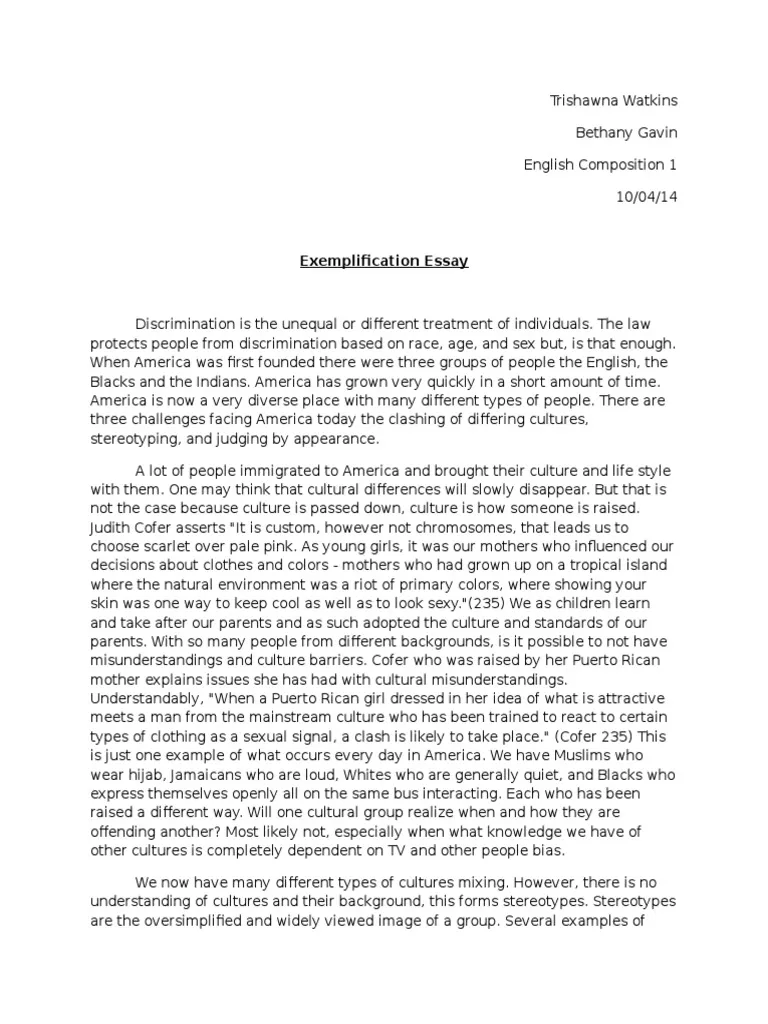Exemplification essays are a compelling form of academic writing that aims to provide concrete examples, evidence, or cases to support a thesis statement or argument. These essays serve as powerful tools to illustrate and clarify ideas, making complex concepts more accessible to readers. In this comprehensive guide, we will explore the art of writing exemplification essays, dissecting the structure, discussing various types, providing exemplification essay examples, and offering 20 engaging exemplification essay topics.
Table of Contents

How to Write an Exemplification Essay
Writing an exemplification essay involves several key steps:
a. Choose a Clear Thesis Statement: Start by selecting a well-defined thesis statement that conveys the main point or argument you intend to exemplify throughout your essay.
b. Gather Strong Examples: Collect a variety of relevant and compelling examples, including anecdotes, statistics, facts, or specific cases that illustrate and support your thesis.
c. Organize Your Examples: Plan the order in which you will present your examples to create a coherent and logical flow in your essay.
d. Provide Context: Introduce each example with enough context to help the reader understand its relevance and significance concerning your thesis.
e. Analyze and Explain: After presenting an example, analyze and explain how it supports your thesis. Clarify the connection between the example and the main argument.
f. Transition Smoothly: Ensure smooth transitions between examples and paragraphs, using transitional words and phrases to guide the reader through your essay.
g. Conclude Effectively: Summarize your key points and restate your thesis in the conclusion, emphasizing the significance of the exemplified evidence.
The Structure of an Exemplification Essay
An evaluation essay consists of several essential elements:
a. Introduction:
The introduction grabs the reader’s attention with a compelling hook.
It presents a clear and concise thesis statement that outlines the criteria for evaluation and the overall judgment.
A brief preview of the examples or evidence to be discussed may be included.
b. Body Paragraphs:
Each body paragraph focuses on a distinct criterion or aspect of the subject.
It begins with a topic sentence that introduces the specific criterion.
The writer provides evidence, examples, or data to support the analysis of the criterion.
An explanation of how the evidence relates to the thesis statement and supports the overall judgment is crucial.
c. Counterarguments (Optional):
While not always necessary, addressing potential counterarguments or opposing viewpoints strengthens the essay’s credibility.
It demonstrates that the writer has considered various perspectives and still supports their judgment.
d. Conclusion:
The conclusion summarizes the main points discussed in the body paragraphs.
It restates the thesis statement and provides a final evaluation of the subject based on the evidence presented.
The conclusion may offer insights into the broader implications of the evaluation.
Types of Exemplification Essays
Exemplification essays come in several forms:
Evaluation essays come in various forms, including:
a. Descriptive Evaluation Essays:
These essays primarily focus on describing the subject and its attributes before evaluating it.
They provide a detailed overview of the subject before passing judgment.
b. Judgmental Evaluation Essays:
In these essays, the writer assesses the subject based on specific criteria and passes judgment, providing a clear and well-supported evaluation.
c. Comparative Evaluation Essays:
Comparative essays evaluate two or more subjects based on specific criteria, highlighting similarities and differences to determine which is superior or preferable.
d. Explanatory Evaluation Essays:
These essays not only evaluate the subject but also provide explanations and justifications for the evaluation, often by citing evidence or supporting arguments.
Tips for Writing an Exceptional Evaluation Essay
To craft a compelling evaluation essay:
- Choose a Subject: Select a subject that you are passionate about, have knowledge of, and can access enough evidence to support your evaluation.
- Define Clear Criteria: Clearly define the criteria you will use to evaluate the subject. These criteria should be relevant and specific to the subject and your thesis.
- Gather Evidence: Collect concrete evidence, examples, or data that support your evaluation. Ensure that your evidence is credible and well-documented.
- Structure Your Essay: Organize your essay with a clear introduction, body paragraphs dedicated to each criterion, a potential counterargument section, and a strong conclusion.
- Use Strong Transitions: Use transitional words and phrases to ensure smooth transitions between paragraphs and examples.
- Be Objective: Maintain an objective tone throughout the essay, avoiding excessive personal bias or emotional language.
Exemplification Essay Examples
Let’s examine two exemplification essay examples to better understand how to use evidence effectively:
Example 1: Supporting a Health Thesis
Thesis: Regular exercise is essential for maintaining physical and mental health.
Examples: Detailed instances of improved physical health, increased mental well-being, and reduced stress levels due to regular exercise.
Excerpt:
Regular physical activity has numerous benefits for both physical and mental well-being. Consider the case of John, a middle-aged man who incorporated daily exercise into his routine. Within months, he noticed significant improvements in his physical health. He shed excess weight, reduced his cholesterol levels, and witnessed a marked increase in energy. These tangible changes were not limited to his physical health; they extended to his mental well-being as well. John reported feeling less stressed, more focused, and generally happier in his daily life. His story exemplifies the transformative power of regular exercise on overall health.
Example 2: Advocating for Environmental Conservation
Thesis: Individual actions play a significant role in environmental conservation.
Examples: Specific cases of individuals adopting eco-friendly practices, reducing waste, and participating in conservation initiatives.
Excerpt:
To understand the impact of individual actions on environmental conservation, we can look at the case of Sarah, a dedicated environmentalist. Sarah made a conscious effort to reduce her carbon footprint by adopting eco-friendly practices in her daily life. She started by using reusable shopping bags, minimizing plastic waste. Over time, she transitioned to a plant-based diet, reducing her contribution to greenhouse gas emissions associated with the meat industry. Moreover, Sarah actively participated in local conservation initiatives, planting trees, cleaning up litter, and educating her community about sustainable practices. Her story illustrates that even on an individual level, adopting environmentally conscious habits and participating in conservation efforts can collectively make a substantial difference in preserving our planet.
These exemplification essay excerpts showcase specific examples that support the respective theses. Each example provides concrete details and context to help readers understand how the evidence relates to the thesis statement and strengthens the argument within the essay.

20 Exemplification Essay Topics
Here are 20 compelling exemplification essay topics to inspire your writing:
- The Impact of Technology on Personal Relationships.
- The Role of Education in Shaping Character.
- The Influence of Social Media on Modern Communication.
- The Benefits of a Healthy Diet and Lifestyle.
- The Importance of Time Management in Academic Success.
- The Effects of Climate Change on Global Ecosystems.
- The Significance of Cultural Diversity in Modern Society.
- The Role of Leadership in Organizational Success.
- The Benefits of Renewable Energy Sources in Reducing Pollution.
- The Impact of Social Movements on Political Change.
- The Role of Family in Child Development.
- The Consequences of Online Privacy Breaches.
- The Influence of Art and Music on Emotional Well-being.
- The Effects of Urbanization on the Environment.
- The Importance of Critical Thinking in Decision-Making.
- The Role of Gender Equality in Economic Development.
- The Benefits of Volunteerism in Community Building.
- The Impact of Fast Food Consumption on Health.
- The Influence of Advertising on Consumer Behavior.
- The Significance of Early Childhood Education in Lifelong Learning.
Conclusion
Evaluation essays are a versatile form of academic writing that allows writers to critically assess and judge a wide range of subjects. By understanding the fundamental elements and types of evaluation essays, and by following essential tips, you can effectively craft an evaluation essay that informs, persuades, and engages your readers while offering valuable insights into the subject at hand.
Frequently Asked Questions
What is an Exemplification Essay?
An exemplification essay is a form of academic writing that uses specific examples, evidence, or cases to illustrate and support a thesis or argument, making complex ideas more accessible to readers.
What are the Elements of an Exemplification Essay?
Elements include an introduction with a clear thesis statement, body paragraphs presenting examples and analysis, smooth transitions, and a conclusion summarizing key points and restating the thesis.
How do I Choose a Topic for an Exemplification Essay?
Choose a topic that interests you, is relevant, specific, possibly controversial, and for which you have access to sufficient examples or evidence to support your argument.
